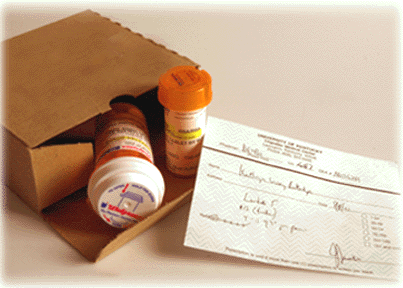IHS Pharmacy Directors: Pharmacy staff to decrease with CMOP implementation?
 I promised you an update on concerns about IHS pharmacies starting to offer central fill mail-order prescription refills through the Veteran’s Affairs Consolidated Mail Outpatient Pharmacy (CMOP) in Leavenworth, KS.
I promised you an update on concerns about IHS pharmacies starting to offer central fill mail-order prescription refills through the Veteran’s Affairs Consolidated Mail Outpatient Pharmacy (CMOP) in Leavenworth, KS.
Some concerns I heard from IHS/tribal pharmacy directors were: How would mailing prescriptions impact the current pharmacy staff? Will mailing prescriptions really be in the interest of patient care, and will every site be required to provide mail service? What about tribal pharmacies-can they get involved? Click here to find out the answers
I spoke to CAPT Pam Schweitzer, IHS-VA National CMOP Coordinator, to ask her these and other common questions about IHS mailing prescriptions and using the VA CMOP.
Read on to find out answers to some FAQs about the program and how the goals above will be met:
 Q: Is pharmacy staff expected to increase, decrease, or stay the same?
Q: Is pharmacy staff expected to increase, decrease, or stay the same?
A: The IHS sites where CMOP has been implemented so far have kept their pharmacy staff, and in some cases have increased pharmacy staff. These sites are fortunate to have good CEO support of the pharmacy department. The pharmacists will be able to spend more time reviewing a patient’s records when processing refills, performing medication reconciliation, and/or fulfilling Improving Patient Care (IPC) objectives that allow pharmacists more time to do clinical work.
Q. Wouldn’t mail-order services be worse off for patient care because the patients don’t get as frequent personal interaction, and our work may become less clinical?
A: Mailing prescriptions can increase patient compliance, especially for patients who live in remote areas and may have transportation barriers that prevent access to the pharmacy. Studies have shown that mailing prescriptions can increase patient adherence. Yet if a patient chooses to go to your pharmacy to pick up medications instead, he/she can still choose to do so. The pharmacists’ time will likely be freed up to provide more clinical services for patients, because pharmacists won’t need to be involved with filling nor verifying the prescriptions.
Q: What are the less known features of VA CMOP that will be beneficial to patient care?
A:  Patients can be provided with a 30-day supply of medications at each fill, increasing the possibility for billing and reimbursement for drug costs (especially if a site is currently dispensing 90 day supplies).
Patients can be provided with a 30-day supply of medications at each fill, increasing the possibility for billing and reimbursement for drug costs (especially if a site is currently dispensing 90 day supplies).
Patients are able to request their medication early (before the next fill is due) using a new feature in RPMS called Suspense.
Example: patient picked up medication today. He/she can request refill right now for their next fill.
Q: How will staff pharmacists’ & pharmacy technicians’ roles change due to CMOP implementation?
Staff pharmacists will still be involved with processing the refill prescriptions and will likely have more time to review the patient’s electronic record and manage medication therapy.
The pharmacy technicians’ workload of filling prescriptions will decrease, allowing more time for monitoring point-of-sale billing and inventory management. One additional duty the technicians have with CMOP is answering the phone and looking up tracking information if the patient didn’t receive their medication.
Stay tuned in a future issue to find out the rest of the answers to FAQs like whether every site will be required to use VA CMOP and what may be in store for tribal facilities. You’ll also see how CMOP would work if integrated with your pharmacy services.
Expecting pharmacy staffing needs in your IHS/tribal pharmacy? Not looking for just a warm body? Get options – select IHS-experienced pharmacists for your pharmacy



